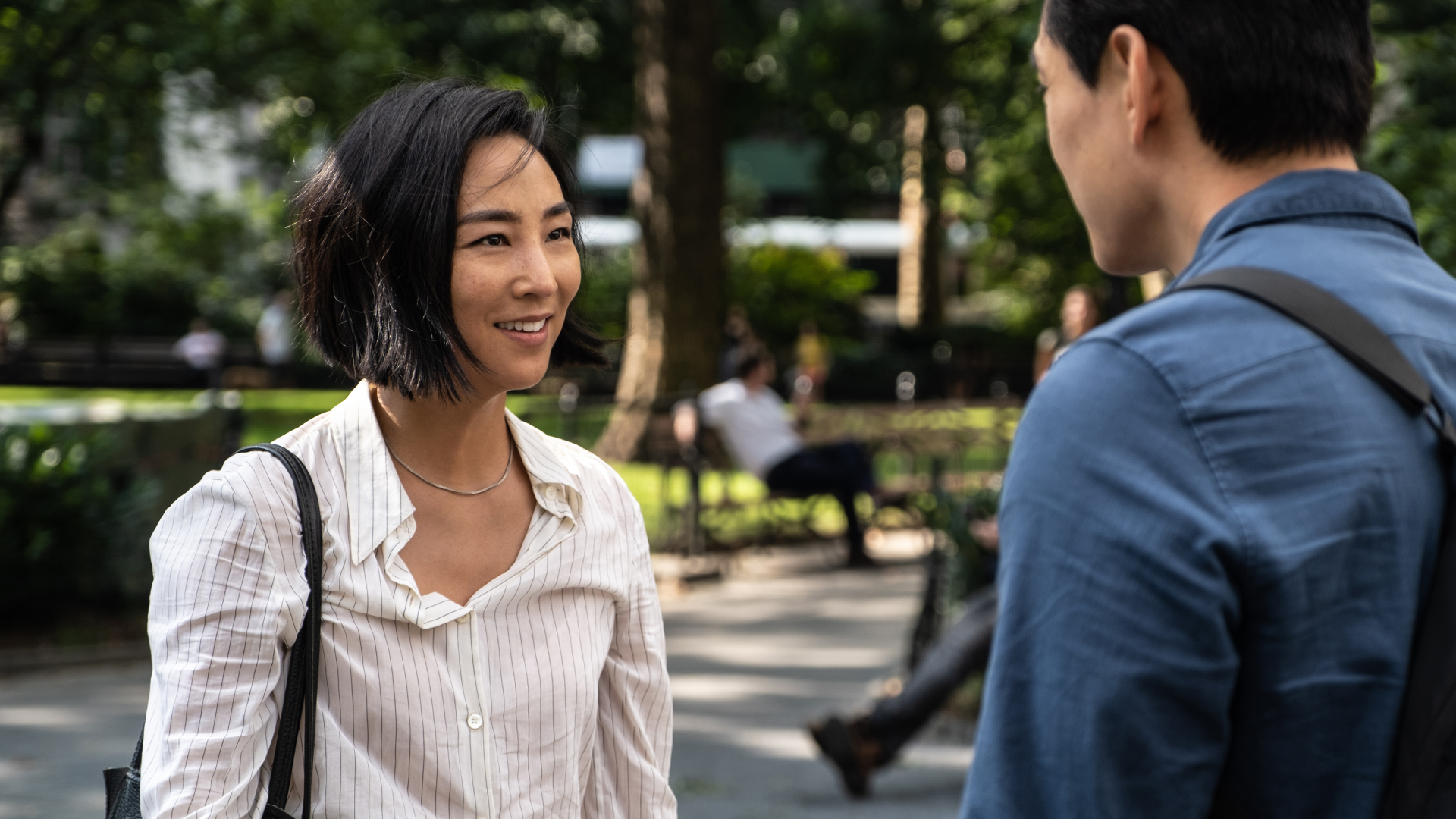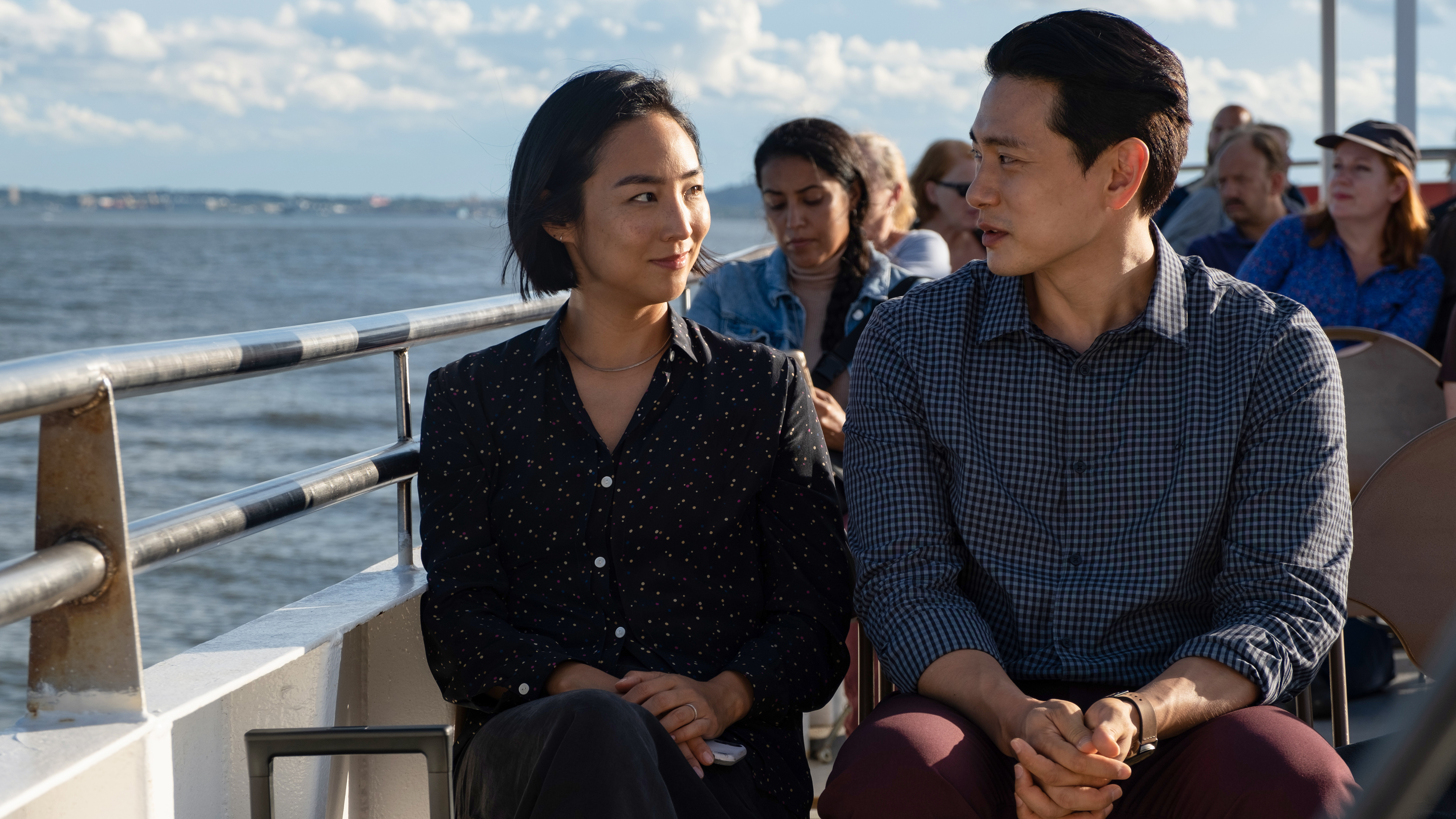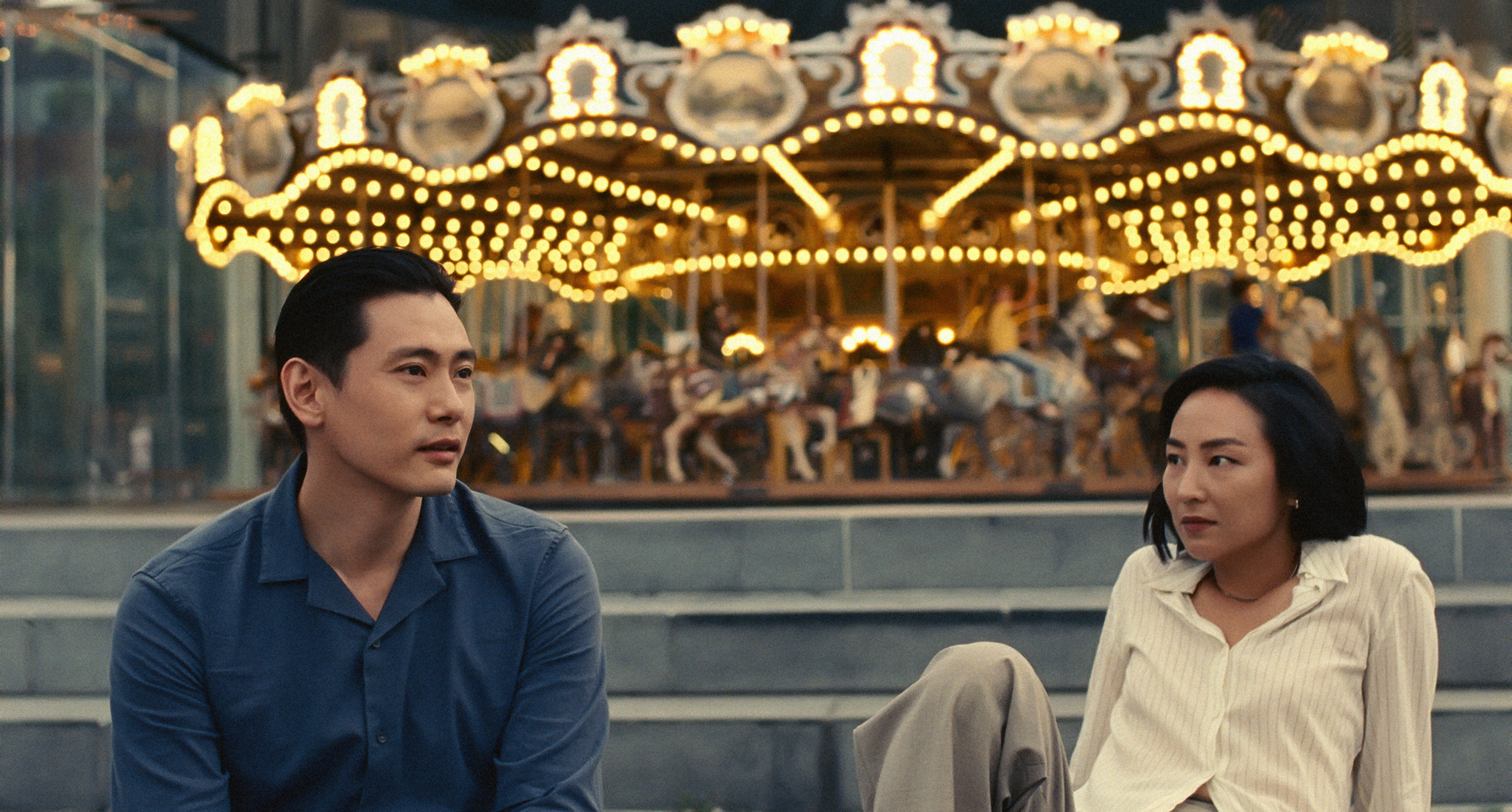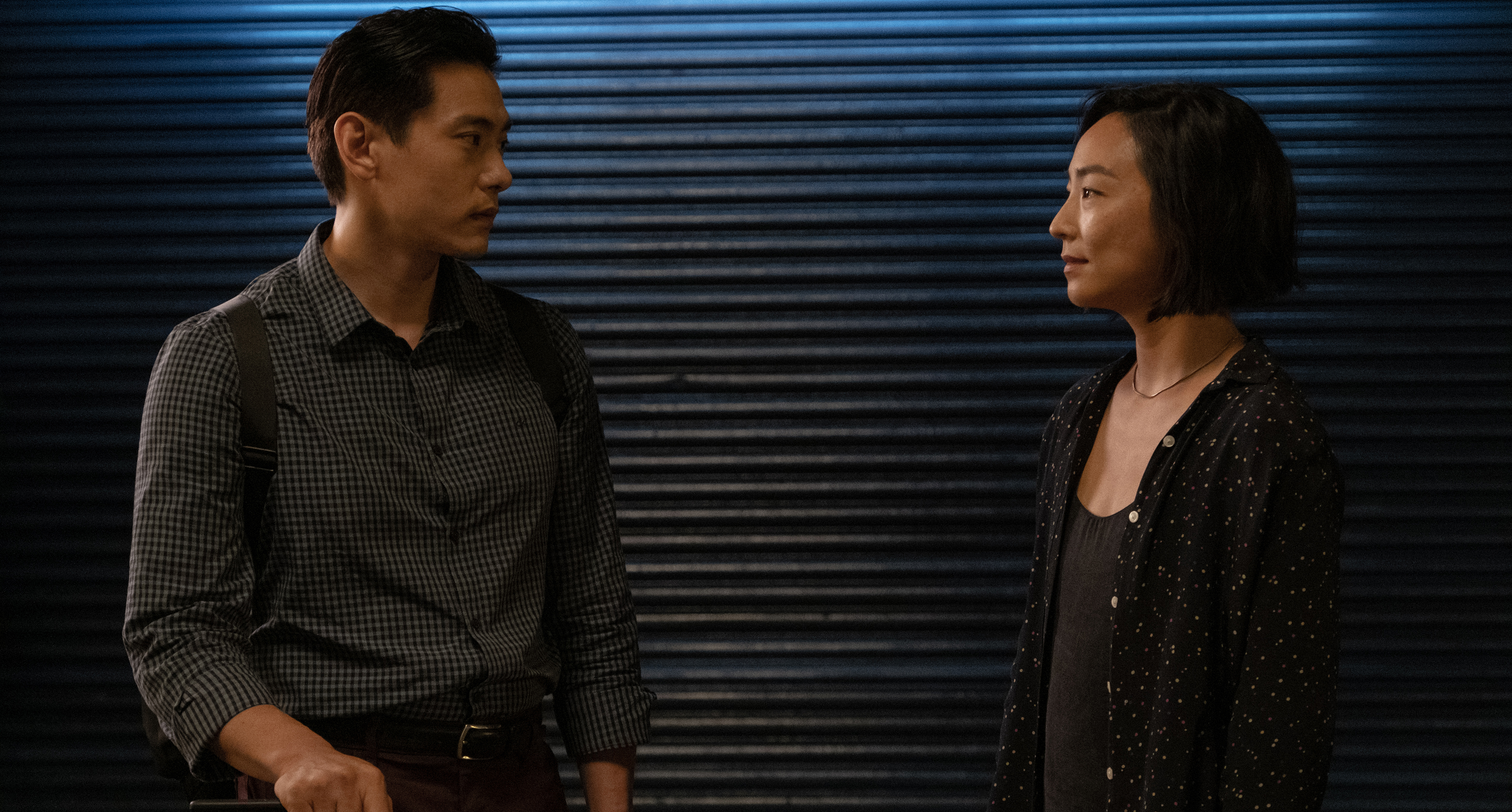Greta Lee on How Filming 'Past Lives' Felt Like Skydiving
The actress, who has a career-defining performance in one of the year's best movies, breaks down the challenges she faced while filming the existential romance, her views on what ifs, and how she thinks Nora's story plays out.

Warning: Spoilers for Past Lives ahead. There are many layers of in-yun (인연), a Korean term meaning providence or fate, between actress Greta Lee and Nora, the playwright Lee portrays in the profound A24 film Past Lives. Directed and written by Celine Song, the semi-autobiographical drama which released nationwide on Friday, follows the decades-long romance of Nora and Hae-sung, childhood sweethearts who reunite twenty-some years after Nora immigrates to North America. Lee, an LA-native who’s best known for playing bold characters in shows including The Morning Show and Russian Doll, had her own kind of delayed reunion with the film, landing the role of Nora more than a year after she was initially passed over for the part. Her career-defining performance shows why the actress was truly meant for the film as she seamlessly embodies an ambitious, thoughtful woman pulled between two loves in an existential story for the ages.
Here, Lee chats about how the role resonated with her experience as a Korean-American actor, what she thinks becomes of Nora and Hae-sung’s love story, and how Billie Eilish helped her get into character.
Marie Claire: What was your first reaction to reading this script?
GL: I had a very visceral reaction to the script. I went into it not knowing anything about it. Even though I had my start in theater like Celine did, I wasn't aware of her. I cried so much that I remember it was hard to read, which isn't a typical experience that you have when you just get sent a script in this traditional process of receiving material... It felt like a kind of movie that I'd loved for so long and the kind of movie that made me want to act at all as a kid... So it was not a very casual encounter. It felt pretty epic.

Greta Lee and co-star Teo Yoo in a scene from 'Past Lives.'
How did your audition and first chat with Celine go after that?
GL: I [recorded my audition] myself, and I remember feeling like, Oh wow, this is going to be a leap. Because I'd never done anything in a different language nor in Korean… I remember feeling thrilled by the challenge of even getting to read for something like this. And then I didn't get it. I had a funny experience where I got a phone call from an assistant saying, 'Can you meet at Cafe Cluny in the Village for this important meeting?' I thought, Oh my gosh, I got the part. And it turned out that message was [meant] for Greta Gerwig [Ed. note: The meeting with Gerwig was unrelated to Past Lives.]
So it couldn't have felt clearer that it wasn't going to go my way. It was just one of those moments as an actor; This is a part of it, and you just let go and accept that it's not going your way. Then a full year later, completely out of the blue, I got a call asking if I would meet with Celine and read scenes. We talked for a long time, and her vision for the movie was so sacred and so specific. After a really incredible conversation together, she offered me the job and I was like, ‘What? This is wild.’ In that way, it kind of embarrassingly reflects some of the core ideas of the movie. It did feel cosmic and fated. I felt like I had in-yun with the script and then in-yun with Celine, and then it all came to fruition in this way.
Get exclusive access to fashion and beauty trends, hot-off-the-press celebrity news, and more.
What was your experience preparing for Nora and playing a character who has so many layers?
GL: This movie was like skydiving, on multiple fronts. It felt like the physical equivalent of that moment of jumping out of a plane and just having to trust that your parachute works. Having come from doing so much comedy—playing these characters who I've really loved and will continue to love—and doing more heightened performances, [this film was] much more naturalistic with more of a realistic type of acting. It's a space that I've wanted to belong in for so long, but I haven't had the opportunity to do that. But I didn't realize that, for me, at this point in my career, how exposing it would feel. There were days I wanted to pull my hair out because I couldn't believe the extent to which I had nowhere to hide. I didn't have costuming or special cool eyeliner or a speech pattern. Even though I'm not playing myself; I'm really different from Nora. I grew up in L.A., and I'm thoroughly American. My parents emmigrated from Korea, but my entire immigrant experience is really different. However, I still did feel this level of like, I'm really showing something that I kind of tucked away in a closet for almost my whole [adult] life. Even speaking Korean felt like that was a private part of myself that wasn't meant to share. I feel like I'd been explicitly trying to put it away in order to be who I am as a woman living and working in America—within certain systems and infrastructures. So then to be asked, 'No, you have to show that,' I cannot adequately articulate how scary that was, and how much I actually learned about myself, in a way maybe that isn't so entirely different from Nora. I remember, after we finished filming, my intense grief and devastation from just saying goodbye and not speaking Korean like that again.
The whole movie is about the choices you make—the person you choose, a city you choose to live in, or a job you choose to take—and all the ones that you don't choose.
The universal aspect of the film is really lovely—even people who don't have the immigrant experience can be so impacted by the story because it's such a basic human thing. It's like, ‘Yep, all people are just people.’
GL: The whole movie is about the choices you make—the person you choose, a city you choose to live in, or a job you choose to take—and all the ones that you don't choose. This idea that we're all human beings and implicit in that is that we're all going to die. We only have this one shot [and] the supreme injustice of that as an idea. How do we confront that? How do we go on living our lives? Understanding that is the essence of being a person, no matter who you are or where you come from. I think that was what we were hoping to convey through cultural specificity. Ultimately it's just about love.
Are you the type of person who dwells on what ifs? Or are you like Nora, where you can just accept the path you’ve chosen?
GL: I think I'm somewhere in between. The thing about Nora that's so amazing is she is so steady in what she wants. She is so unapologetically ambitious. When we meet her in New York, she's good. She's flourishing. It's from that place she's unexpectedly forced to confront this person who acts as a hologram to a different part of her life or a different life she could have had. For me, personally, I can relate. I was using my own experiences as someone who can identify as a modern working woman in America and plowing forward. I can understand that sense of living without regrets. I think that's sometimes the goal. And yet, I think in the process of living that way, there is this vulnerability that can emerge, especially for women. I feel like we're taught to be so strong and to hold it together on multiple fronts. It is that secret softness, I guess, that emerges [from within Nora] that made this story so beautiful and also kind of devastating.

How was your experience filming the Skype scenes? Was Teo Yoo in the room with you, or did you actually have to form the emotional connection between the characters through a screen?
GL: Literally what you see in the movie is what the experience was for us. We were separated, and we only had the laptop to communicate with each other. When we first started shooting those scenes, there was the fear of, ‘How do you convey chemistry or longing or a long history of a deep connection with someone through a laptop camera?’ I remember I felt so unexpectedly self-conscious, and we realized that I needed to be alone in my room. Originally we had the camera department and sound department there with me while I would be Skyping with Hae-sung, during those first encounters where [we're] falling in love again, and it's just a very pure expression of love. Something just felt off and Celine had the incredible foresight to observe like, ‘Greta needs to be alone in order to do this in a way that felt free of being self-conscious.’ … [The characters are] so respectively isolated, and they're building their own world together that kind of suspends actual time and space through Skype.
I’m also curious, was it more difficult to film the Skype scenes or that final walk to the Uber where there’s like two whole minutes of silence?
GL: They were unique challenges. They had unique sort of goalposts that we were trying to hit and technical aspects of it. That last scene was a single tracking shot from the apartment over to the Uber, saying goodbye, and then walking back. From the jump it was always understood that it was going to be captured in one long take. We were betting on a very specific emotional arc for the movie where Nora does not cry. It's imperative that she doesn't cry because she says she doesn't cry anymore. There are so many moments [throughout the film] where I felt, as an actor, this is really hard just to trust that the audience, who we've invited to go on this ride, will be with us at the end when she finally cries. That was a full enterprise shooting that scene. It was really like an orchestra with multiple instruments and a conductor, and so many different moving parts while shooting in the East Village—which is also no joke. We were joking that we had no divas on set except New York City herself. That scene will maybe go down as one of the most specifically challenging types of scenes as an actor, because you also can't practice certain things. So much of what we do is you prepare as much as you can, but there's no practicing what that emotional release is going to be.
What was your experience of sitting with the finished film and seeing everything unfold on screen?
GL: The first time I saw it on a big screen was at Sundance, and I remember being terrified. I remember asking Celine—I was joking—but I was like, ‘Do we actually have to show this movie? Like, can we just not show the movie?’ I'd never felt that way about something that I'd done before where it felt dangerous to show. I just didn't know how it was going to be received, and it felt like it's so personal and shows such a vulnerable side of all of us as actors. And Celine laughed. She was like, ‘Yeah, a pretty essential part of moviemaking is showing the movie.’...At the end of the movie, I remember hearing and feeling people get restless, or like reaching for things, shuffling their feet, and shifting around. I honestly thought, Oh no, we lost them. And I felt this devastation. And then I realized that is what a mass group of people crying sounds like. It is people reaching for tissues, or just the discomfort with crying… You never know how the movie that you were making will be received by actual moviegoers. So that was amazing and totally crazy.

Where do you think Nora is in the future? Do you think that she got the Tony Award? Do you think that she kept in touch with Hae-sung?
GL: I think she got the Tony. That's important. She got the Tony and she is living her life as the woman we see her to be in the movie. Ever since she was a child, she's so true to herself, and that is something that's so unique to the kind of woman that could be at the center of this kind of a story—what's conventionally a love triangle. I understand the impulse to ask and to wonder what her relationship is to Hae-sung now. I'm reluctant to answer that, but I think that I can say that there is a part of me that believes that that door is closed. That's what makes this movie the kind of thing that hopefully will stay with you long after you've seen it. It's understanding that the essence of being a human is you can't have it all. You can't have more than just the life that you're living. That goodbye is so much more than just her saying goodbye to a boy she used to love. It's saying goodbye to this part of her life that just can't and won't exist anymore. On a happier note, [saying goodbye] leaves space for everything else, and her future. There's that Billie Eilish song where she talks about being in love with her future. I remember that was on my playlist when we were making this movie. What an exquisite feeling that is for a woman, to be like, ‘My first love is my Future, capital F.’ That is what makes Nora so exquisite to me and that is what this movie is ultimately about. It's about life. I know that maybe it's disappointing to some people who think that there's gonna be like a trilogy where she runs off and finds him, but I don't know if that's true.
It's really interesting that you bring up love triangles. To me, Past Lives is such a unique experience from the typical love triangle rom-com. Has there ever been a moment where you've considered whether viewers could perceive the film as something very different than its original intention?
GL: In the entire experience of making this film, that is what was so vulnerable making, just in terms of being cognizant of what the expectation is for a movie that is billed as a romance and a love triangle and what that means, while holding true to what we wanted, which is something that, for me, was much more sacred and much more free of spectacle. I'm so happy that we can continue to carve out space for movies like this. It's a grownup movie. There's almost no shouting there, there are no villains, there's no explicit sex. There's some very intense touching. While we were making it, I think we were constantly trying to push away the conventions or the expectations of what a different kind of movie could be, in the name of something that we believed in more. Now that the movie has come out and we can share it with people, we are free of ownership in a lot of ways. It's now up to the moviegoers. It's your movie. We continue to be totally floored by talking to people who feel connected to this kind of a movie and what we were trying to say, both in how mundane and simple it is, but then simultaneously how massive and cosmic in scale it can feel.
Quinci LeGardye is a Culture Writer at Marie Claire. She currently lives in her hometown of Los Angeles after periods living in NYC and Albuquerque, where she earned a Bachelor’s degree in English and Psychology from The University of New Mexico. In 2021, she joined Marie Claire as a contributor, becoming a full-time writer for the brand in 2024. She contributes day-to-day-content covering television, movies, books, and pop culture in general. She has also written features, profiles, recaps, personal essays, and cultural criticism for outlets including Harper’s Bazaar, Elle, HuffPost, Teen Vogue, Vulture, The A.V. Club, Catapult, and others. When she isn't writing or checking Twitter way too often, you can find her watching the latest K-drama, or giving a concert performance in her car.